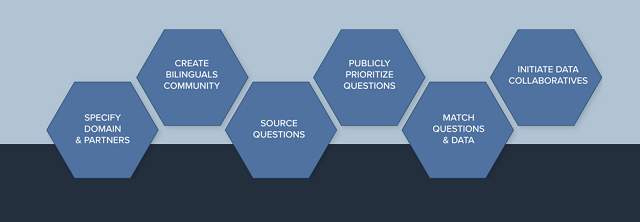UPDATE, 9/7/2020: Vote now! Help us decide which questions should be prioritized to advance the study of air quality by voting on the 10 finalist questions from The GovLab and WRI now.
We know that air pollution is a big problem – for health, climate, food security and more. But there’s a difference between generally knowing that “we need to do something” and actually marshalling the allies, resources and power to act.
Before we jump into seeking answers with big data, we need to focus on the questions that can make a difference. Our new initiative calls on the air quality and data community to join us in building a new science of questions for clean air and more.
Too often, we operate as if simply appealing to broad, abstract rationality – providing evidence of harm or proving the cost-effectiveness of a solution – is enough to drive action. We should know by now that it’s not. Action requires actors, and actors have perspectives, concerns, priorities and constraints. They have specific questions, both about the “Why act?” and the “What to do?”
Consider the calculus of an elected politician. For this leader, the question of how much his or her constituents care about pollution and how they rate it against other concerns might be the key to determining whether to support a new policy. Similarly, a mayor might ask, “Is it better to use this year’s budget to upgrade the bus fleet or update waste segregation?” Neither may be the “best” solution, but these are the choices available. A regulator may focus on who is responsible for pollution – not what sector, but which plant? Forecasts are useful for people who can change their routines to avoid pollution, but scenario analysis helps planners to anticipate the longer-run impacts of their choices about infrastructure.
What are the questions that elicit answers that spur action? What are the questions people ask before deciding to make a difference in their own lives, for their neighbors, for their constituents or others? What are the decisions that people actually have in front of them and what are the questions they ask in deciding which way to go? In short – what are the questions that matter? And what are the answers we should invest in to accelerate clean air?
World Resources Institute and New York University’s The Governance Lab are partnering to answer just such questions about questions. The GovLab’s 100 Questions Initiative, launched with funding from Schmidt Futures and Data2X, is pioneering a new science of questions – how to systematically, efficiently identify the questions that matter and highlight the answers worth investing in. WRI’s air quality program, building on its decades of experience helping cities, nations and regions manage natural resources that are the foundation of economic opportunity and wellbeing, seeks to accelerate equitable, universal access to clean air. We share a common belief that we must define the questions well to provide the answers that matter, to build and sustain the coalitions and concerted action we need for change.
We need your help. WRI has done an initial mapping of the questions and answers that seem to matter at different stages of the air pollution awareness to action lifecycle, but we are using The GovLab’s Smarter Crowdsourcing methodology to refine these hypotheses and draw on the wisdom of the broader air quality community. The first part involves identifying and connecting “bilinguals,” people with both domain knowledge and data expertise.
Figure 1: The 100 Questions Methodology

Through this framework, we then collect from them the questions that matter most and could be answered if relevant data were made available. After this expert-sourcing process, the questions received will be summarized and published to let the public vote on which inquiries they think should be prioritized. The products of these phases will facilitate our work on Data Collaboratives and other initiatives aimed at addressing the generated questions.
Why the Right Questions Matter
Our deep dive into questions is a natural continuation of WRI’s work on mapping the path from awareness of air pollution to action that actually solves it. WRI’s review of the political economy of air pollution has identified several stages in the path from knowing the air is bad to actually cleaning it up. You can hear more on Jessica Seddon’s podcast, but here’s a brief recap.
Air pollution is the product of the choices that individuals, households and companies make every day. It comes from the way we eat, the way we move, the way we cook and the way we power our economies. These choices, in turn, are often just responses to market, economic and social context – a background that will have to change to get to cleaner air for all.
And in order for that to happen, rising awareness of air pollution as a problem has to turn into a politically viable demand for clean air. Cleaning up the air can be very expensive for a few polluters, while a much bigger group shares the benefits of safe air. This makes for challenging politics: the many beneficiaries of clean air have to organize to see effective policies against vested interests that have little incentive to take action. Next, the groups demanding clean air have to know enough to hold policymakers and regulators accountable for the right action: they need to focus on the sources that actually matter for that place and time. These are not always obvious. Emissions are invisible, pollution travels long distances and sometimes it’s formed from multiple sources.
Once the demand for clean air has focused into demand for the right actions, there are two further hurdles: policy and planning need to change to set the enabling conditions for cleaner air, and any new regulatory policy or investment plans need to actually be enforced. Simply declaring a commitment to clean air, setting an air quality standard or tightening emissions restrictions is still a long way from seeing pollution emissions go down. All of these steps are achievable, but they need to be tackled.
Figure 2: WRI’s Pathways for Change

We’ve done a preliminary evaluation of what kinds of science matter at each stage – what questions might accelerate the movement from awareness to action. At the start, what’s needed is anything that helps expand the data on air quality to more places and then makes sure that the data, however imperfect it may be, gets out to more people. But then the messages need to become more personalized and relevant for groups that already exist and could be mobilized to be effective advocates for clean air. Citizen science projects that focus on monitoring air quality near schools, for example, don’t add much to the larger data of how many people suffer illnesses related to pollution, but they do raise the political pressure for action. Source attribution (identifying where pollution comes from) helps focus attention and pressure for change on the actions that will clean up the air.
The questions and answers that help market and policy instruments work are yet another group. If so many people want clean air, one might ask, why can’t we set up market-based instruments to invest in it? Some initiatives, such as the IFC’s Breathe Better Bond, are doing just that. But market-based instruments don’t work if the return on investment – the improvement in air quality that comes from switching from diesel to electric buses – cannot be calculated. And so this becomes an important enabling question. And enforcement – making sure that legal limits on emissions are respected, that investment programs have the impact they claim and that what’s on paper is in fact actual practice – requires specific, facility-level data. This is a different set of questions and answers than “how bad is the air today,” but essential for solutions.
But what do you see? What questions do you think are essential for tipping the balance from awareness to action?
Next Steps
The project is part of The GovLab’s work on data collaboratives, a new form of collaboration, beyond the public-private partnership model, in which participants from different sectors – in particular companies – exchange their data to create public value. Their work shows that all kinds of data, from sensor data to online purchase data, can address public problems and improve people’s lives. Once the questions are formulated, we will seek to find ways, through data collaboratives and other means, to generate insight that can address the challenges identified with air pollution.
Our partnership on air quality is the third domain area to be launched. The other domain areas include gender, which Data2X supports, and migration, which involves the International Organization on Migration and the Joint Research Centre at the European Commission. Further domains will be launched in the coming months.
Please let us know if you want to be part of our exercise, either as experts or as an institutional or data partner, by getting in touch here. Contact Stefaan Verhulst at The GovLab at sverhulst@thegovlab.org to be added to our community.
This blog was originally published on WRI’s Insider.
is Air Quality Manager at WRI México.
is Director of Integrated Urban Strategy at WRI Ross Center for Sustainable Cities.







